Top Rankings
Spring Lake School District ranks among the top 20% of public school district in Michigan for:
Category
Attribute
Overall Rank
Highest overall rank (Top 5%)
Math Proficiency
Highest math proficiency (Top 5%)
Reading/Language Arts Proficiency
Highest reading/language arts proficiency (Top 5%)
Science Proficiency
Highest science proficiency (Top 5%)
Graduation Rate
Highest graduation rate (Top 10%)
Community Size
Largest student body (number of students) (Top 1%)
For the 2025 school year, there are 2 public preschools serving 788 students in Spring Lake School District.
Public Preschools in Spring Lake School District have an average math proficiency score of 85% (versus the Michigan public pre school average of 32%), and reading proficiency score of 83% (versus the 40% statewide average).
Minority enrollment is 10% of the student body (majority Hispanic), which is less than the Michigan public preschool average of 39% (majority Black).
Overview
This School District
This State (MI)
# Schools
6 Schools
1,089 Schools
# Students
2,293 Students
372,198 Students
# Teachers
143 Teachers
24,811 Teachers
Student : Teacher Ratio
16:1
16:1
District Rank
Spring Lake School District, which is ranked within the top 1% of all 851 school districts in Michigan (based off of combined math and reading proficiency testing data) for the 2021-2022 school year.
The school district's graduation rate of 95% has decreased from 97% over five school years.
Overall District Rank
#10 out of 866 school districts
(Top 5%)
(Top 5%)
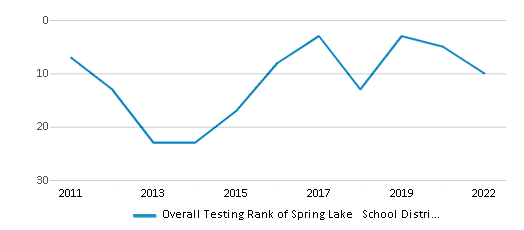
Math Test Scores (% Proficient)
69%
34%
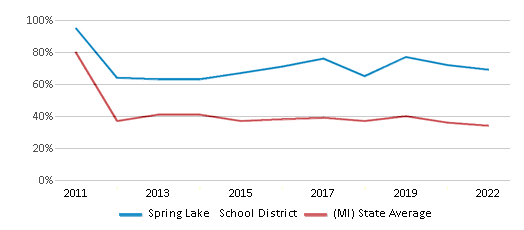
Reading/Language Arts Test Scores (% Proficient)
76%
45%
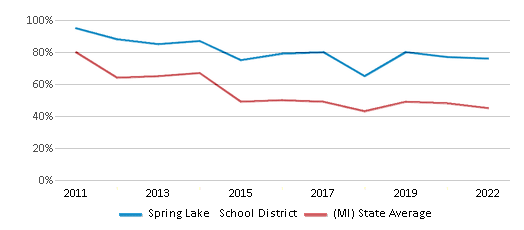
Science Test Scores (% Proficient)
62%
38%
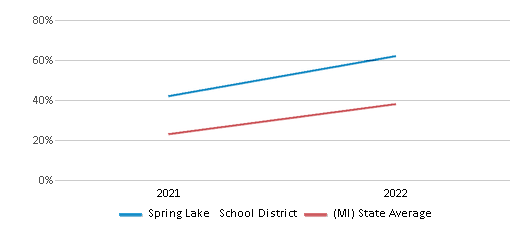
Graduation Rate
95%
81%
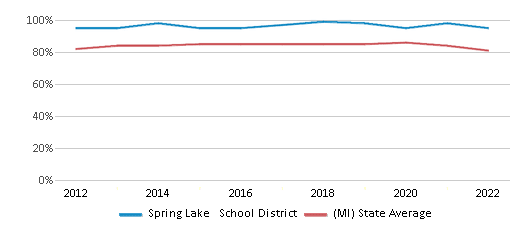
Students by Ethnicity:
Diversity Score
0.18
0.58
# American Indian Students
1 Student
2,804 Students
% American Indian Students
n/a
1%
# Asian Students
36 Students
11,161 Students
% Asian Students
2%
3%
# Hispanic Students
82 Students
33,151 Students
% Hispanic Students
4%
9%
# Black Students
15 Students
79,200 Students
% Black Students
1%
21%
# White Students
2,076 Students
225,969 Students
% White Students
90%
61%
# Hawaiian Students
2 Students
334 Students
% Hawaiian Students
n/a
n/a
# Two or more races Students
81 Students
19,240 Students
% of Two or more races Students
3%
5%
Students by Grade:
# Students in PK Grade:
-
-
# Students in K Grade:
167
69,777
# Students in 1st Grade:
149
60,475
# Students in 2nd Grade:
147
57,993
# Students in 3rd Grade:
164
50,568
# Students in 4th Grade:
161
49,172
# Students in 5th Grade:
156
42,380
# Students in 6th Grade:
172
13,776
# Students in 7th Grade:
167
8,200
# Students in 8th Grade:
202
7,855
# Students in 9th Grade:
192
2,836
# Students in 10th Grade:
191
2,672
# Students in 11th Grade:
218
2,566
# Students in 12th Grade:
207
2,595
# Ungraded Students:
-
1,333
District Revenue and Spending
The revenue/student of $16,841 in this school district is less than the state median of $18,510. The school district revenue/student has grown by 5% over four school years.
The school district's spending/student of $14,539 is less than the state median of $17,693. The school district spending/student has grown by 5% over four school years.
Total Revenue
$39 MM
$25,476 MM
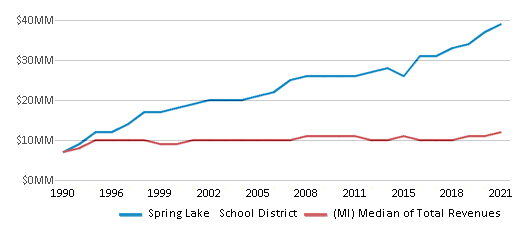
Spending
$33 MM
$24,351 MM
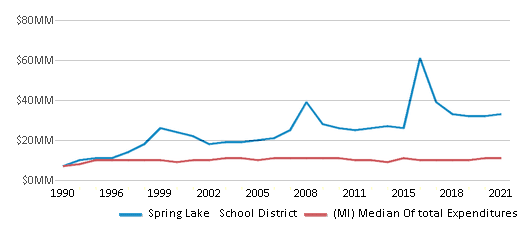
Revenue / Student
$16,841
$18,510
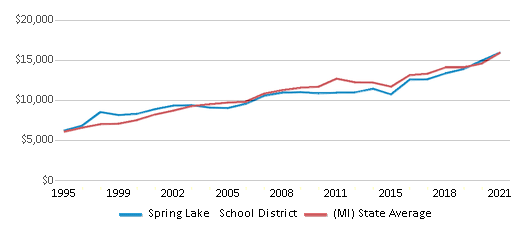
Spending / Student
$14,539
$17,693
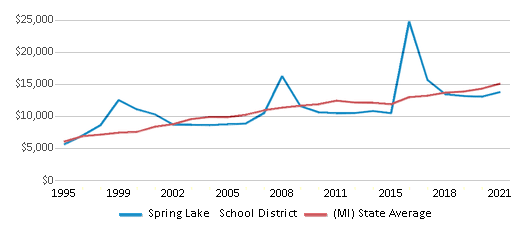
Best Spring Lake School District Public Preschools (2025)
School
(Math and Reading Proficiency)
(Math and Reading Proficiency)
Location
Grades
Students
Rank: #11.
Holmes Elementary School
(Math: 85-89% | Reading: 85-89%)
Rank:
Rank:
10/
Top 1%10
426 River St
Spring Lake, MI 49456
(616) 846-5504
Spring Lake, MI 49456
(616) 846-5504
Grades: PK-4
| 420 students
Rank: #22.
Jeffers Elementary School
(Math: 80-84% | Reading: 75-79%)
Rank:
Rank:
10/
Top 5%10
16031 144th Ave
Spring Lake, MI 49456
(616) 846-5503
Spring Lake, MI 49456
(616) 846-5503
Grades: PK-4
| 368 students
Recent Articles

What Is A Charter School?
Explore the world of charter schools in this comprehensive guide. Learn about their history, how they operate, and the pros and cons of this educational innovation. Discover key facts about charter schools, including admission policies, demographics, and funding, as well as what to look for when considering a charter school for your child.

10 Reasons Why High School Sports Benefit Students
Discover the 10 compelling reasons why high school sports are beneficial for students. This comprehensive article explores how athletics enhance academic performance, foster personal growth, and develop crucial life skills. From improved fitness and time management to leadership development and community representation, learn why participating in high school sports can be a game-changer for students' overall success and well-being.

February 05, 2025
Understanding the U.S. Department of Education: Structure, Impact, and EvolutionWe explore how the Department of Education shapes American education, from its cabinet-level leadership to its impact on millions of students, written for general audiences seeking clarity on this vital institution.





